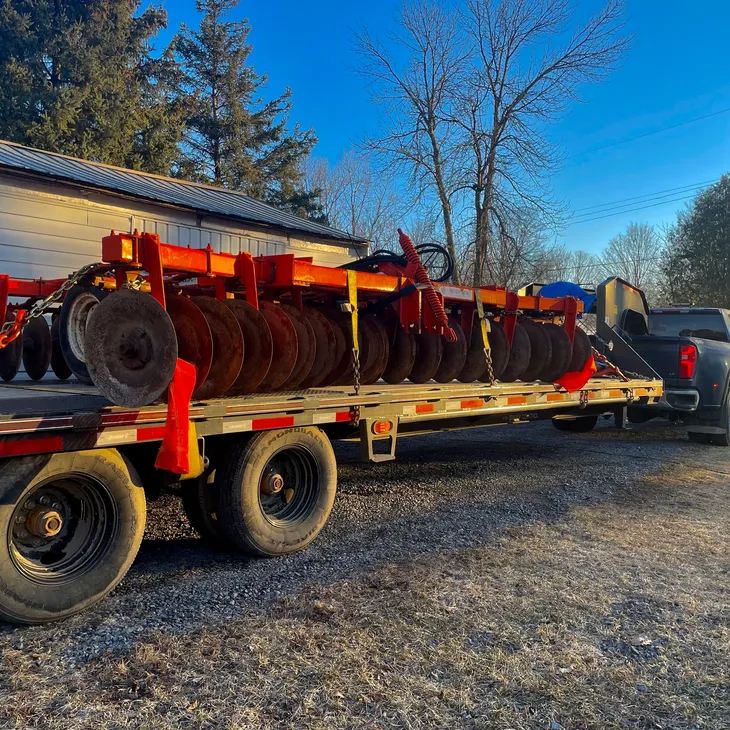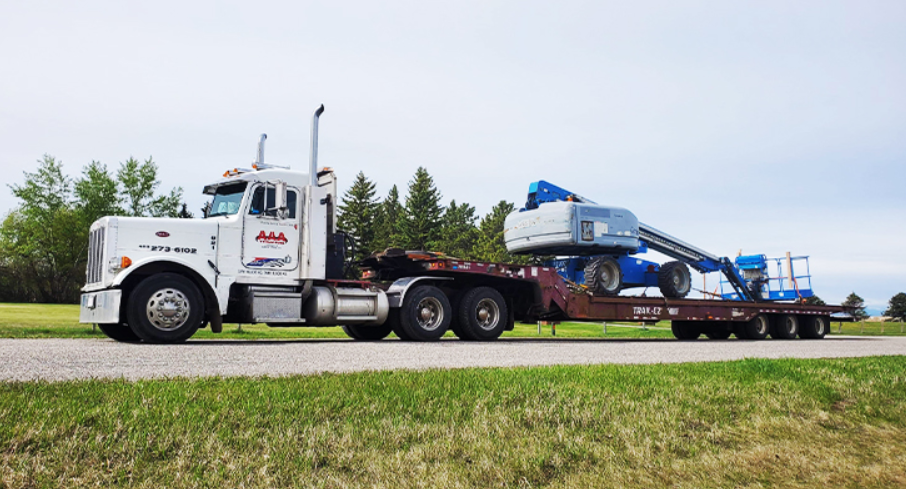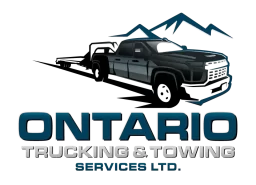
Transportation and Towing Agricultural Products and Equipment in Ontario
Ever had the excitement of a bumper harvest and then pondered on how to get it across Ontario? Imagine a service that ensures your agricultural products, straight from the farm, are safely and efficiently transported right where they need to be. That’s exactly what’s being offered here. Benefits? Immense! From cutting down transportation hassles to ensuring your products retain their freshness during the journey, it’s a win-win for every farmer, distributor, and consumer. Why opt for this service? Because you deserve a solution that understands agriculture as deeply as you do. So, why wait? Let’s get those products moving!
Welcome to OC-Services, where we pride ourselves on being the best in towing agricultural products throughout Ontario. With our cutting-edge equipment and a highly skilled team, we ensure that your agricultural products reach their destination safely and on time.
Overview of Ontario’s Agricultural Sector
Ontario stands as a beacon of agricultural productivity, contributing significantly to Canada’s farm-based economy. From vast grain fields to robust livestock farms, Ontario’s agricultural products are varied and abundant. As the need for transportation of these products continues to grow, so does the demand for reliable truck and trailer services to ensure timely and efficient delivery.
Importance of Reliable Transportation and Towing Services
Towing agricultural products isn’t just about hitching a trailer to a truck and setting off. It involves understanding the intricacies of vehicle transmissions, ensuring the weight of the load is within capacity, and navigating the diverse terrains of Ontario farms. The ball, tongue, receiver, and gooseneck hitches have their distinct uses and advantages, and choosing the right one can make all the difference. Ensuring that your vehicle’s brakes, lights, and suspension are up to the task is crucial for safety, especially when towing loads that can weigh several tons. The combination of the right equipment, experience, and service ensures that Ontario’s agricultural products reach their destinations in the best possible condition.
The Basics of Truck and Trailer Towing
Anatomy of a Truck and Trailer Setup
When towing agricultural products in Ontario, understanding the basic anatomy of your truck and trailer is crucial. Trucks, whether they’re powered by gas or diesel, play the pivotal role of the ‘powerhouse,’ while the trailer acts as the carrier. Key components of the truck include its transmission, which can either be manual or automatic, and its drive system, which determines its towing capacity. On the other hand, the trailer comes with its axle system, brakes, and suspension, all of which need to be in top condition for effective towing.
Understanding the Terminology: Hitch, Ball, Tongue, and More
For those new to the towing industry or those looking to enhance their knowledge, grasping the terminology can be enlightening. The hitch is the connecting point between your truck and trailer, and the type of hitch you select (ball, receiver, gooseneck) depends on the weight and size of the load. The ball hitch, one of the most common, is versatile and works for many medium-sized loads.
Meanwhile, the tongue weight is the force that the trailer exerts on the hitch, and understanding this is essential to ensure the safety and stability of the entire towing setup. There are also additional terms like custer (a term associated with lighting and signal products) and other equipment essentials that one should familiarize themselves with for comprehensive knowledge in towing.
A Deep Dive into Hitches: Types and Their Uses
Ball Hitches
The ball hitch is arguably the most common type found on trucks and trailers in Ontario. This hitch involves a ball and coupler mechanism, where the ball is attached to the towing vehicle and the coupler is situated on the trailer tongue. They come in various sizes to handle different weight capacities, ensuring safety and stability during transportation of agricultural products. Whether you’re towing a few hundred pounds or several tons, selecting the appropriate ball size and weight rating is crucial.
Receiver Hitches
Receiver hitches are a versatile option for those who require flexibility in towing. These hitches consist of a receiver tube, into which different ball mounts can be inserted based on the specific towing need. There are different classes of receiver hitches, ranging from Class I (light-duty) to Class V (heavy-duty), each designed to handle varying loads. They’re especially beneficial when the towing vehicle has to cater to different trailers and loads, ensuring the right fit for products ranging from grains to heavy farm equipment.
Gooseneck Hitches
For those in the agricultural sector who are transporting particularly heavy loads, gooseneck hitches might be the answer. These are installed in the bed of a pickup truck and are particularly known for their high weight capacities, often accommodating loads of several tons. The design of the gooseneck hitch offers increased stability and maneuverability, especially when navigating tight turns on farm terrains. They’re ideal for those who prioritize safety, stability, and the ability to tow heavy machinery or large volumes of agricultural products.
Vehicle Compatibility and Considerations
Choosing the Right Vehicle for Towing Agricultural Products
When it comes to towing agricultural products in Ontario, not every truck or vehicle is up to the task. The nature of the products – whether they’re heavy machinery, grains, or livestock – often determines the type of vehicle required. The transmission, be it manual or automatic, the engine power, and the fuel type (gas or diesel) all play pivotal roles in defining the towing capacity. Understanding the specifics of your vehicle, including its axle strength and total load capacity in pounds or tons, can make a world of difference in ensuring efficient transportation.
Drive Options: 2WD vs. 4WD
The type of drive in your vehicle can significantly influence its towing capabilities. A 2WD (Two-Wheel Drive) is often suitable for flat terrains and lighter loads. However, for rugged farm landscapes and heavier loads, a 4WD (Four-Wheel Drive) is usually the preferred choice. The 4WD offers better traction, reducing the risk of getting stuck in muddy or uneven terrains – a common challenge in the agricultural sector.
Understanding Vehicle Suspension and Brakes
Suspension systems in towing vehicles are paramount for ensuring a smooth ride, especially when transporting sensitive agricultural products. Depending on the load’s weight, one might require reinforced suspension systems to prevent the vehicle from sagging or experiencing undue strain. Furthermore, an efficient brake system is non-negotiable. Given the added weight of trailers and loads, brakes need to be in optimal condition to handle sudden stops and ensure safety on the road. Regular maintenance and checks on both suspension and brake systems are imperative for safe and effective towing.
Factors to Consider When Loading Agricultural Products


Securely Loading for Weight Distribution and Safety
Loading agricultural products onto a trailer is more than just stacking items inside. Proper weight distribution is vital. Whether you’re loading several tons of grain, farm equipment, or any other product, ensuring even distribution across the trailer’s axle prevents undue strain on the vehicle’s suspension and transmission.
The tongue weight – or the amount of the trailer’s weight that presses down on the hitch – should be maintained within the recommended range, usually 9-15% of the total trailer weight. Proper distribution ensures safety, preventing trailer sway and offering a smoother drive.
Considering the Type of Product: Grain, Livestock, Machinery, etc.
Different agricultural products have their unique challenges when it comes to loading. For grains, ensuring they’re dry and have proper containers is essential to prevent spoilage. When it comes to livestock, considerations around animal welfare, space, and safety come into play.
Livestock trailers should be well-ventilated, secure, and designed to reduce stress for the animals. For machinery, understanding the weight, dimensions, and securing them with the right equipment is crucial. Whether you use ball hitches, gooseneck, or receiver types, ensuring the products are loaded safely and securely is paramount.
Adapting to Varied Terrains and Environments
Ontario’s vast agricultural landscapes range from flatlands to hilly terrains. Depending on where the farm is located, loading procedures might differ. A farm situated on a slope may require additional safety measures during loading, like chocking wheels or using specialized equipment. Similarly, different weather conditions, whether rain, snow, or high winds, can affect loading operations. Being prepared and adaptable ensures that the products, whether they’re measured in pounds or tons, are loaded without damage or loss.
Farm-Specific Towing Challenges and Solutions
Navigating Rugged and Unpredictable Terrains
Farm terrains in Ontario are as diverse as the agricultural products they produce. From wet, muddy fields after a rainfall to dry, uneven grounds, every farm presents its unique towing challenges. Trucks and trailers must be equipped with the right type of tires, suspension systems, and drive options (like 4WD) to tackle these terrains. The transmission – whether manual or automatic – plays a pivotal role in managing these landscapes, providing the necessary power and control.
Towing During Harvest Season: Increased Loads and Traffic
Harvest season is a peak period for farms, often leading to increased loads, both in terms of weight (pounds or tons) and volume. The challenge here is twofold: ensuring that vehicles and trailers are up to the task and navigating the increased farm traffic. Proper maintenance of vehicle brakes, lights, and transmissions becomes paramount. Additionally, planning the transportation schedule to avoid peak hours and ensuring that trailers and trucks are equipped with adequate safety lights and signals can mitigate the risks associated with heavy traffic.
Dealing with Weather Variabilities
Ontario’s climate can be quite unpredictable, with sudden rainfalls, snow, or gusty winds. Such conditions can pose significant challenges, especially when towing sensitive agricultural products. Waterproofing measures for grains, proper ventilation for livestock to prevent overheating or chilling, and ensuring the vehicle’s lights and signals (like custers) are functional during low visibility conditions are just some of the necessary precautions. Additionally, fuel considerations come into play, as weather can influence fuel efficiency. Keeping an eye on fuel levels and ensuring you have enough gas or diesel for the journey is crucial.
Cost Factors and Budgeting for Towing Services
Vehicle and Equipment Depreciation
When calculating the costs associated with towing agricultural products in Ontario, one must consider vehicle and equipment depreciation. Trucks and trailers, especially those that frequently tow heavy loads measured in tons, undergo wear and tear. The transmission, whether it’s automatic or manual, can have its lifespan reduced with extensive usage, especially if it’s not well-maintained. Regular checks and replacements can lead to costs, but they’re essential to ensure long-term Service reliability.
Fuel Efficiency and Costs
Fuel remains one of the primary expenses for any towing service. Depending on whether the vehicle uses gas or diesel, the costs can vary. Further, the weight of the load, the efficiency of the vehicle’s engine, and the condition of its transmission can all influence fuel consumption. It’s essential to monitor fuel levels closely and understand the factors that can lead to increased consumption, enabling better budgeting and cost-saving.
Maintenance and Safety Measures
Regular maintenance of trucks and trailers isn’t just about ensuring their longevity but also about safety. Brakes, lights, and suspensions need to be checked periodically, leading to associated costs. Additionally, safety equipment, such as hitches – ball, receiver, or gooseneck – and other towing accessories like custers, also come with their price tags. Budgeting for these regular checks and replacements ensures smooth Service without any unexpected downtimes.
Pricing and Competition in the Ontario Market
The demand for towing agricultural products in Ontario has led to a competitive market. Understanding the current market rates for similar services, and the value-added services you can provide, like specialized equipment or an experienced team, can influence your pricing strategy. It’s beneficial to strike a balance between competitive pricing and ensuring profitability, given the various costs involved in providing top-notch towing Service.
Innovations in Towing and Transportation
Smart Trailer Monitoring Systems
Modern trucks and trailers now come equipped with advanced monitoring systems that can provide real-time data on various metrics. From checking the weight of the loads in pounds or tons, to monitoring the transmission’s performance and fuel efficiency, these systems provide invaluable insights. Whether your vehicle uses gas or diesel, these smart systems can alert drivers about fuel levels, potential issues with the vehicle’s brakes, and even the status of lights and signals.
Advanced Hitching Mechanisms
Innovations in hitching have come a long way from traditional ball and receiver hitches. The modern age sees the rise of electronically adjustable hitches, allowing for on-the-go adjustments to accommodate varying load sizes. There are also advancements in gooseneck hitches that offer increased stability and weight distribution. New designs and materials have been introduced to enhance the hitch’s lifespan and provide smoother towing experiences, especially crucial when transporting sensitive agricultural products.
Eco-friendly Towing Solutions
With increasing emphasis on reducing carbon footprints, the towing industry has not been left behind. Electric trucks with powerful transmissions capable of towing substantial loads are slowly entering the market. These vehicles promise reduced emissions and often come with innovations like regenerative braking systems, which further enhance their eco-friendliness.
Integrated Suspension Systems for Enhanced Stability
Modern trailers are now equipped with integrated suspension systems that can adapt to varying terrains automatically. These systems can detect the type of terrain, whether it’s a smooth highway or a rugged farm track, and adjust the suspension level accordingly. This not only ensures the safety of the agricultural products being transported but also reduces wear and tear on the vehicle’s transmission and overall structure.
The Road Ahead: Predictions for the Future of Agricultural Towing in Ontario


Transition to Greener Fuel Options
As environmental concerns continue to dominate global discourse, there’s a growing push for vehicles that use eco-friendly fuels. The agricultural towing industry in Ontario will likely witness a shift from traditional gas and diesel engines to more sustainable options. Whether it’s electric trucks with high-capacity transmissions or biofuel-powered vehicles, the emphasis will be on reducing emissions while ensuring the power and performance needed for heavy loads.
Automated Towing and Transportation
With advancements in autonomous vehicle technology, the future might see semi-automated or fully automated trucks and trailers. These vehicles, equipped with state-of-the-art sensors, brakes, lights, and transmissions, will be able to navigate the diverse terrains of Ontario farms with minimal human intervention. Automated systems could also optimize fuel consumption based on the weight of the load, ensuring efficient use of resources.
Smart Farm Integration
The convergence of smart farm technologies and towing services will usher in an era of integrated agricultural operations. Imagine trailers that can communicate directly with farm storage units, giving real-time updates on product levels, whether measured in pounds or tons. Or hitches like gooseneck or ball types, automatically adjusting based on the load’s specifications, ensuring maximum safety and efficiency.
Customized Towing Solutions based on Product Type
The diverse range of agricultural products necessitates specialized towing solutions. In the future, we might witness trailers designed specifically for certain products, ensuring their safety and quality during transportation. For instance, trailers with built-in temperature control for sensitive crops or advanced suspension systems for transporting heavy farm equipment without exerting undue stress on the vehicle’s transmission.
Conclusion
Agricultural towing in Ontario represents more than just transporting goods from one location to another. It encapsulates the intricate balance between advanced technology and the age-old traditions of farming. From the careful selection of trucks and trailers to understanding the unique requirements of each agricultural product, there’s an art and science to this industry. Innovations are continually shaping the way we approach towing, promising safer, more efficient, and environmentally-friendly solutions. The journey of towing agricultural products in Ontario showcases the province’s commitment to excellence, blending the strengths of the past with the potential of the future.
As we look ahead, it becomes evident that this industry will continue to evolve, taking strides in automation, sustainability, and integrated farming solutions. It’s an exciting time for all stakeholders, from farmers to towing service providers, as they navigate this dynamic landscape, ensuring that the very best of Ontario’s agricultural products reach their destinations with care, precision, and innovation.
